It's not fiction, it's a fact: Tuvalu is sinking. The impacts of climate change (extreme weather, sea level rise) are challenging Tuvaluan security and survival.
"This remote Pacific atoll is one of the first nations on earth that will lose their home due to climate change and rising sea levels. The only way they can survive is if the global community works together to mitigate climate change to 1.5 degrees centigrade (or less). Otherwise, these islands will be uninhabitable. If the world manages to save Tuvalu, we will have made great strides to reducing global warming and positively impact the rest of the planet. It can be done, but will the world choose to do their part?"
With a menacing sky above us and my dry bag packed with cameras, we are momentarily airborne before the Tara skiff lands with a bone-jarring thud in the stormy sea. It is New Year’s Day, and I am starting 2017 with First World problems: no banks are open for 3 days, there are no ATMs here, I have only US dollars (no one accepts them here), I will come to discover no restaurants are open, I am not even sure if there is a place to stay, and I may have a slight headache from new years eve festivities.
I have sailed hundreds of miles across open ocean to interview the Prime Minister of Tuvalu, and at the moment, the most glaring obstacle is that I don’t actually have an appointment to meet with him.
Located about halfway between Australia and Hawaii in the middle of the Pacific Ocean, Tuvalu has the dubious honor of being our planet’s international poster child for climate change. The tiny island nation is comprised of three reef islands and six low lying atolls.
I wade ashore through waste deep water, with my enormous dry bag hoisted over my head, surrounded by crystal blue water. The idyllic beach where I reach Tuvaluan terra firma, fully clothed and soaking wet, is postcard beautiful. In all of my world travels, my arrival in Tuvalu is surely the most adventurous yet. And I am confident it is worth the gamble. I want to learn firsthand about Tuvaluans as they face the impending threat of rising sea levels due to climate change and how it is impacting them.
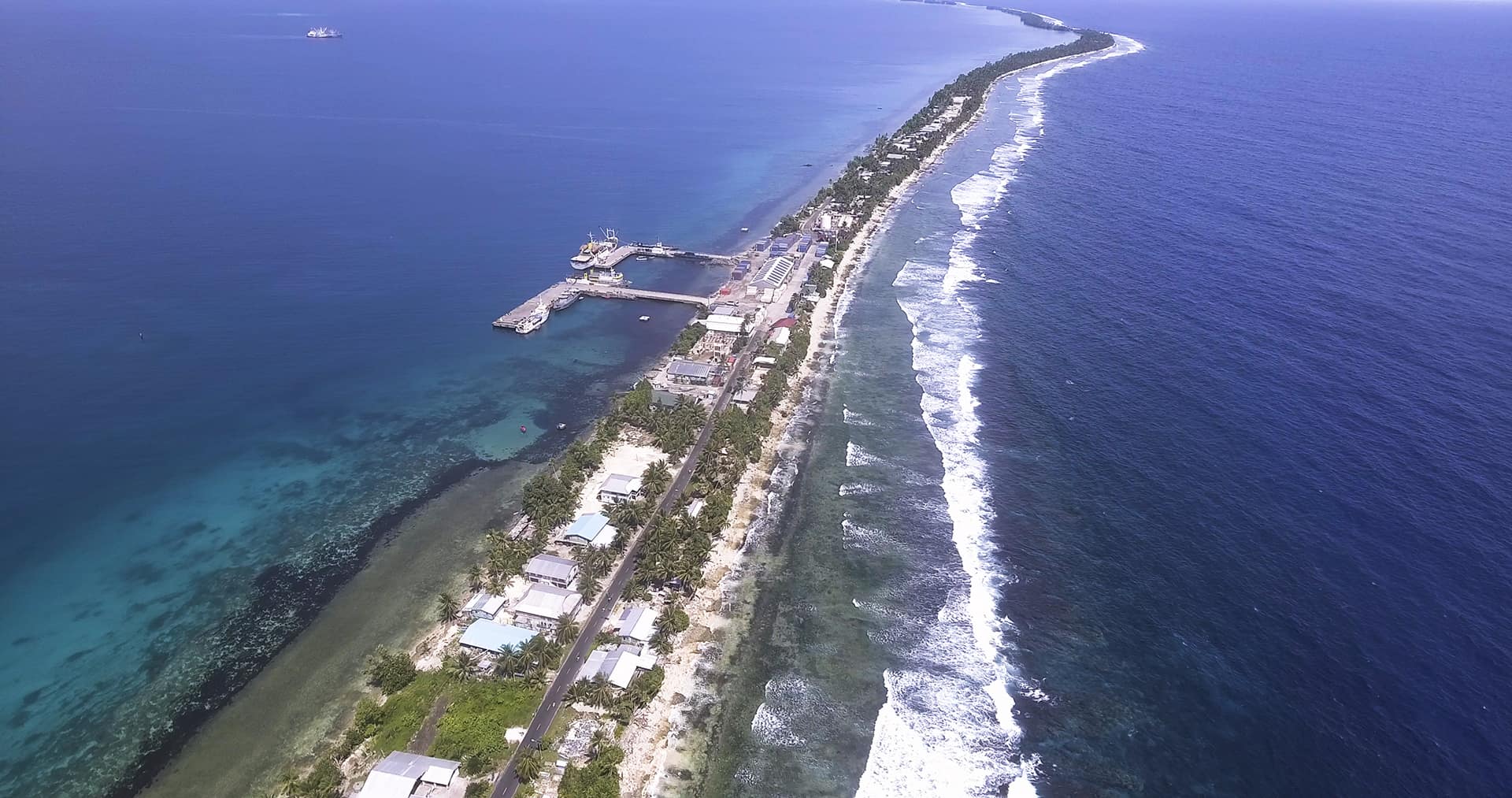
In 2015, the Prime Minister Enele Sopoaga put the country on the world’s radar at the UN Climate Change Conference, when he pleaded with global leaders to work together to mitigate global warming to less than 1.5 degrees centigrade. Anything more than that, and Tuvalu will “sink”. He summed up his speech with the now infamous phrase, “If we save Tuvalu, we save the world.”
The first thing I notice is the narrowness of the atoll. You can walk across the paved road from the lagoon to the ocean in about 12 steps.
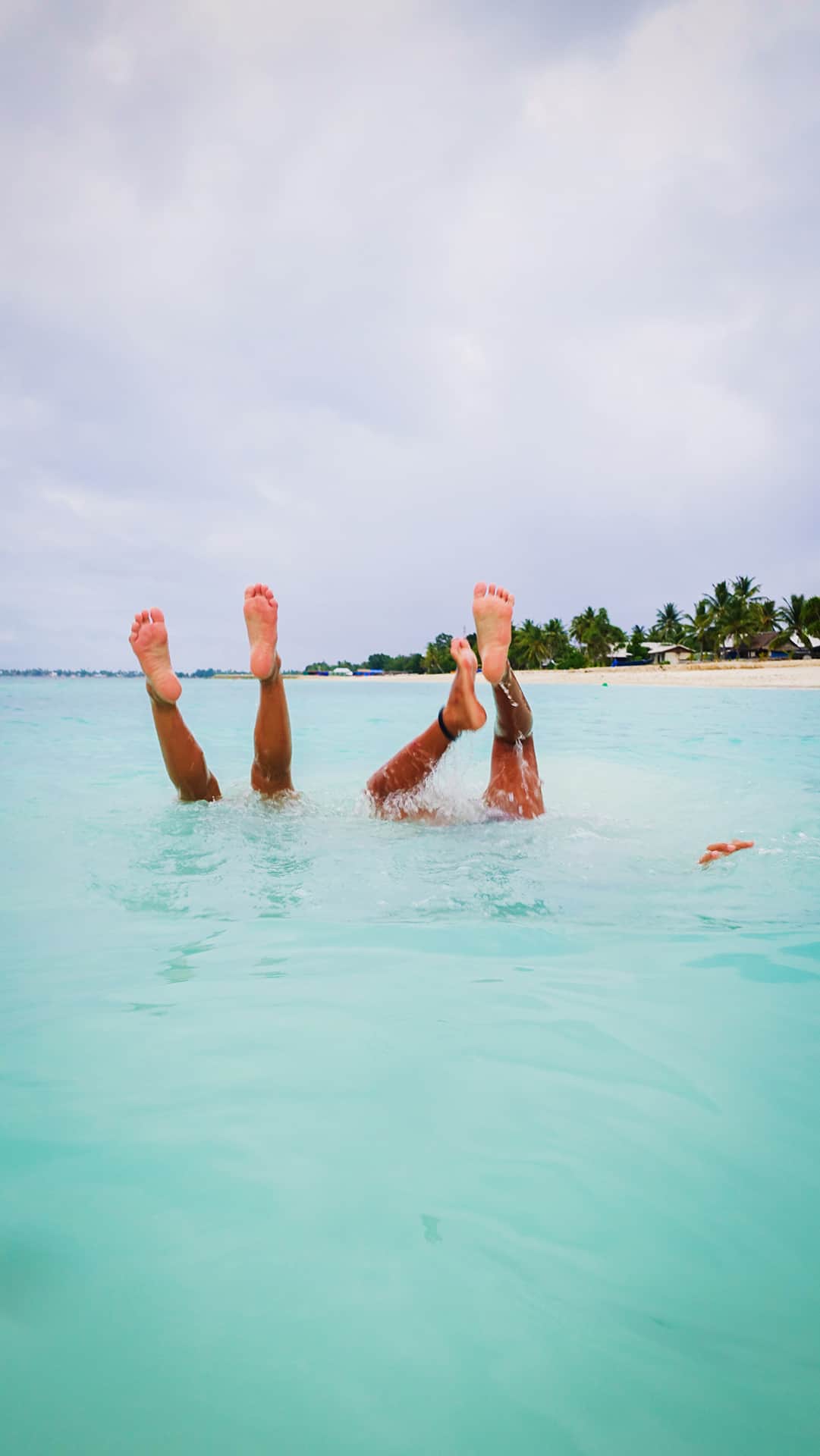
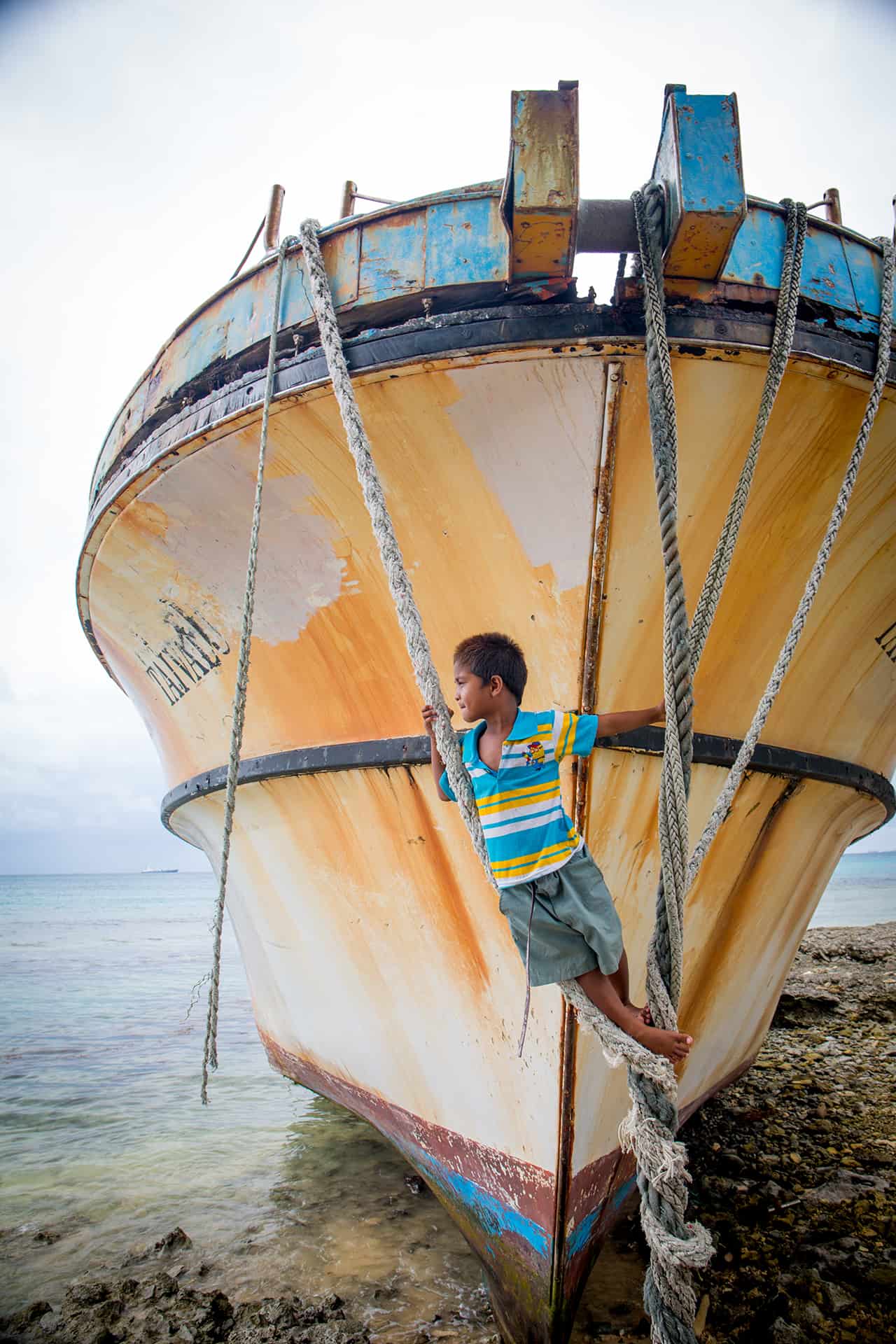
The average height of the islands is 6.6 feet above sea level. During extreme high tides, water is seeping up through the center of the island. Many residents can no longer grow vegetables or bananas here because the brackish water kills them. The islands are “sinking” – and fast.
A local woman, Margaret, agrees to help me find a guesthouse. Cruising on the back of her moped, a warm breeze on my face as I glide down a quiet palm tree-lined road, we pass women dressed in flower print dresses, or sitting side saddle on the back of mopeds with enormous plates of food and everyone offers a friendly smile and a wave. Roosters crow, there is a warm breeze, and no one is in a hurry.
We pass houses made of everything from an abandoned shipping containers to elevated plywood fishing huts to a 100 ft + fishing vessel named “Tuvalu” apparently grounded during a storm, it has become the local jungle gym.
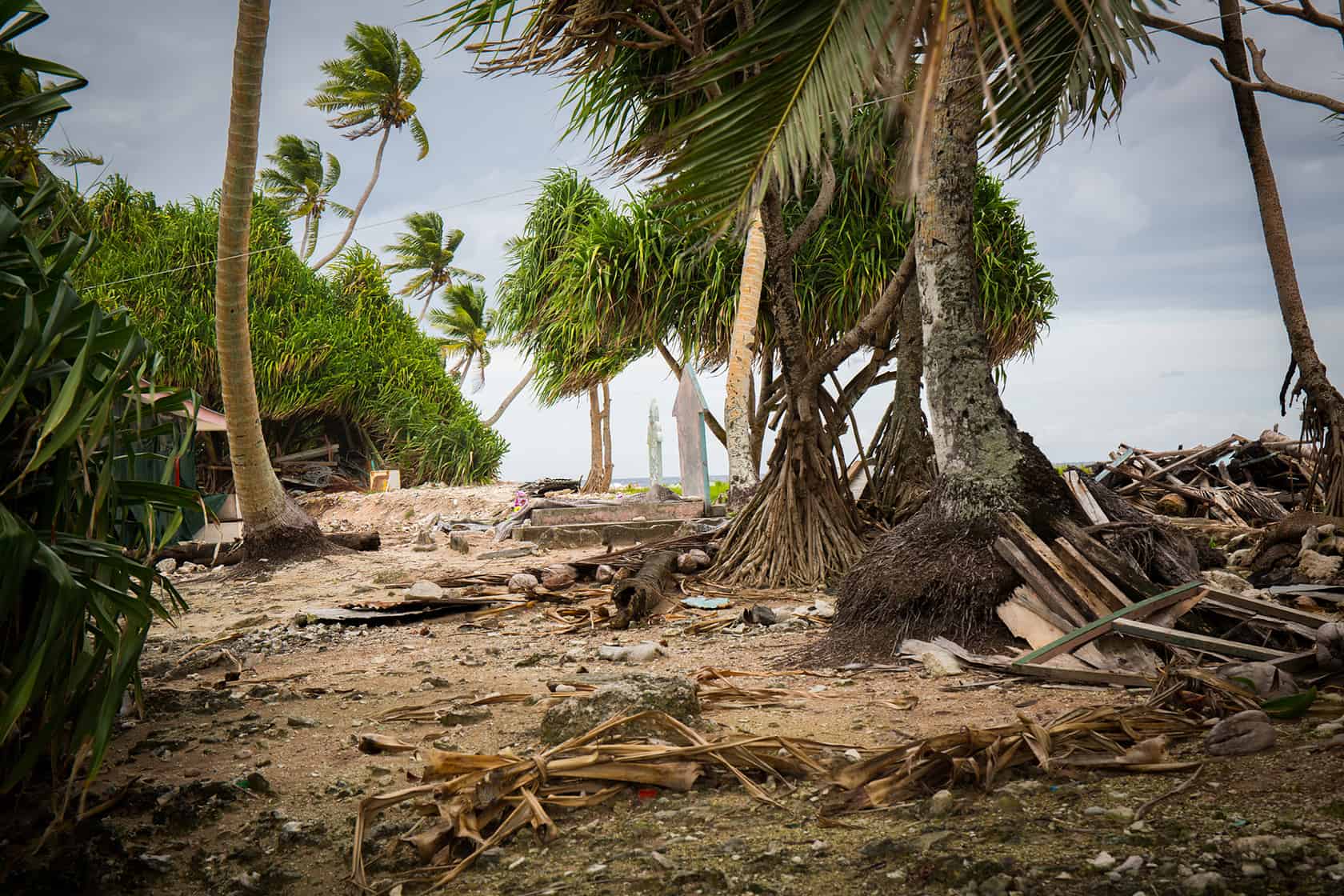
It looks as if people are very happily living in the aftermath of hurricane debris on a gorgeous tropical beach that has only partially been cleaned up. There is a calm beauty to the island’s chaos. Yet it is readily apparent how tropical storms, extreme high tides, coastal erosion, poor sewage management, and declining coral health are wreaking havoc on these vulnerable atolls.
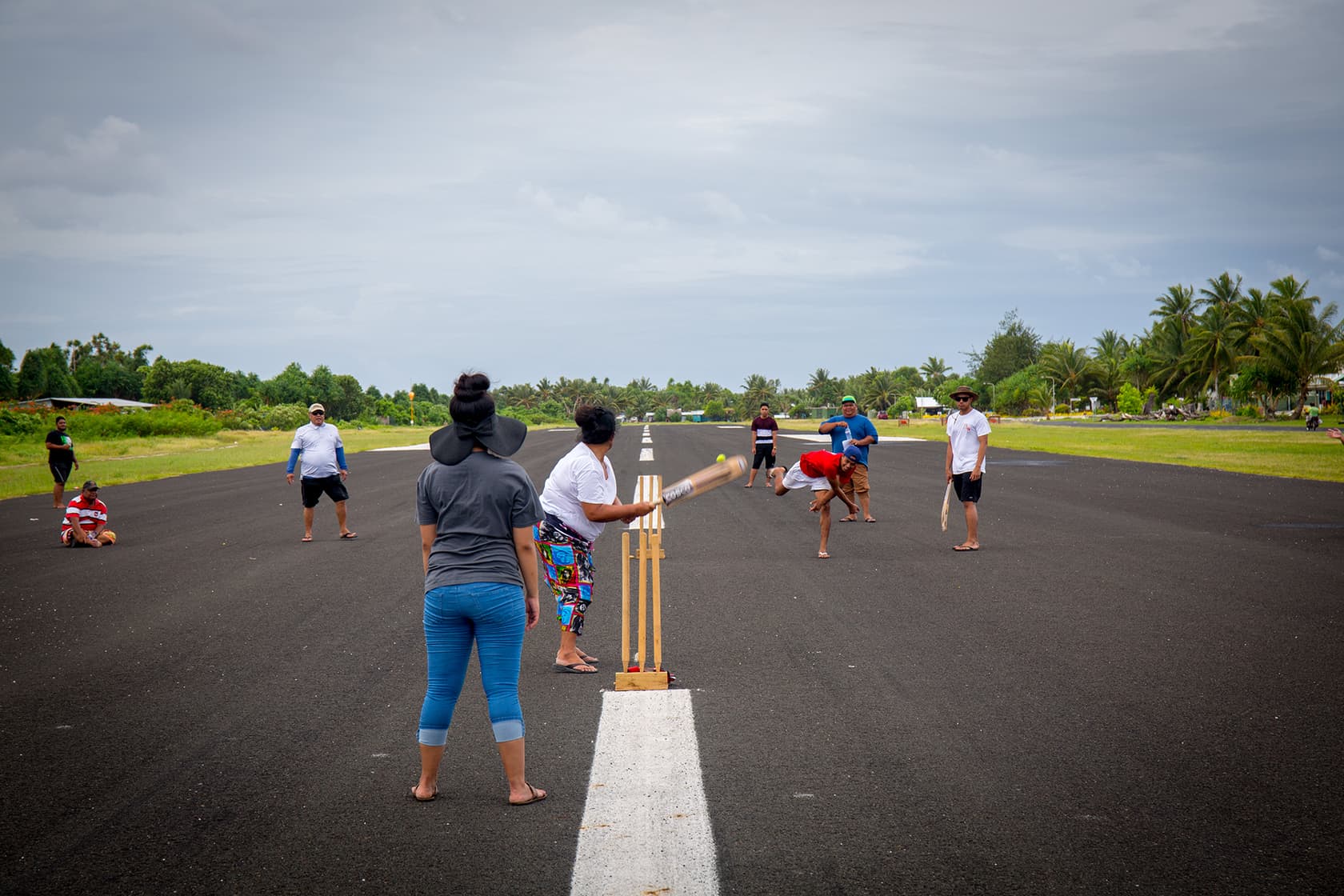
Our conversation reveals what Tuvaluans hold dear: their land, the sea, and their food – pigs, fish, taro. All are firmly rooted in tradition and religion. As we round the last last turn to the guesthouse we drive down the unfenced Tuvalu International Airport runway. I exclaim, “We can drive down the runway?” and Margaret calmly replies, “Only on days when the plane is not coming.”
The guest house owner, in typical Tuvaluan kindness, readily agrees to let me have a room and bottled water on credit until Tuesday when the bank opens. Luckily, her 8-year-old granddaughters are visiting from Fiji and New Zealand – and they speak flawless English. We become immediately enamored with each other. They are fascinated that I had just walked out of the sea with all my belongings. I am taken aback that it is ultimately their lives and future most immediately at risk every time I drive my car instead of walking.
As we tour the island together over the next few days, I realize they have no idea that their grandmother’s idyllic homeland will most likely not be here in 50 years (or less). I ask them whether heard about climate change. They pause and tell me, “We think we talked about it once at school.” The next day, in a moment of audacity, I stop by the Prime Minister’s ocean front “White House.” With no security or gates, I park my scooter in the driveway, stroll up to the front door, take a deep breath, and casually knock. No answer. So I set off to explore alternative gardening projects (some of them floating), mangrove restoration sites, the island pig pens, the meteorology center, and of course, joyride down the center of the runway on my moped – just because I can.
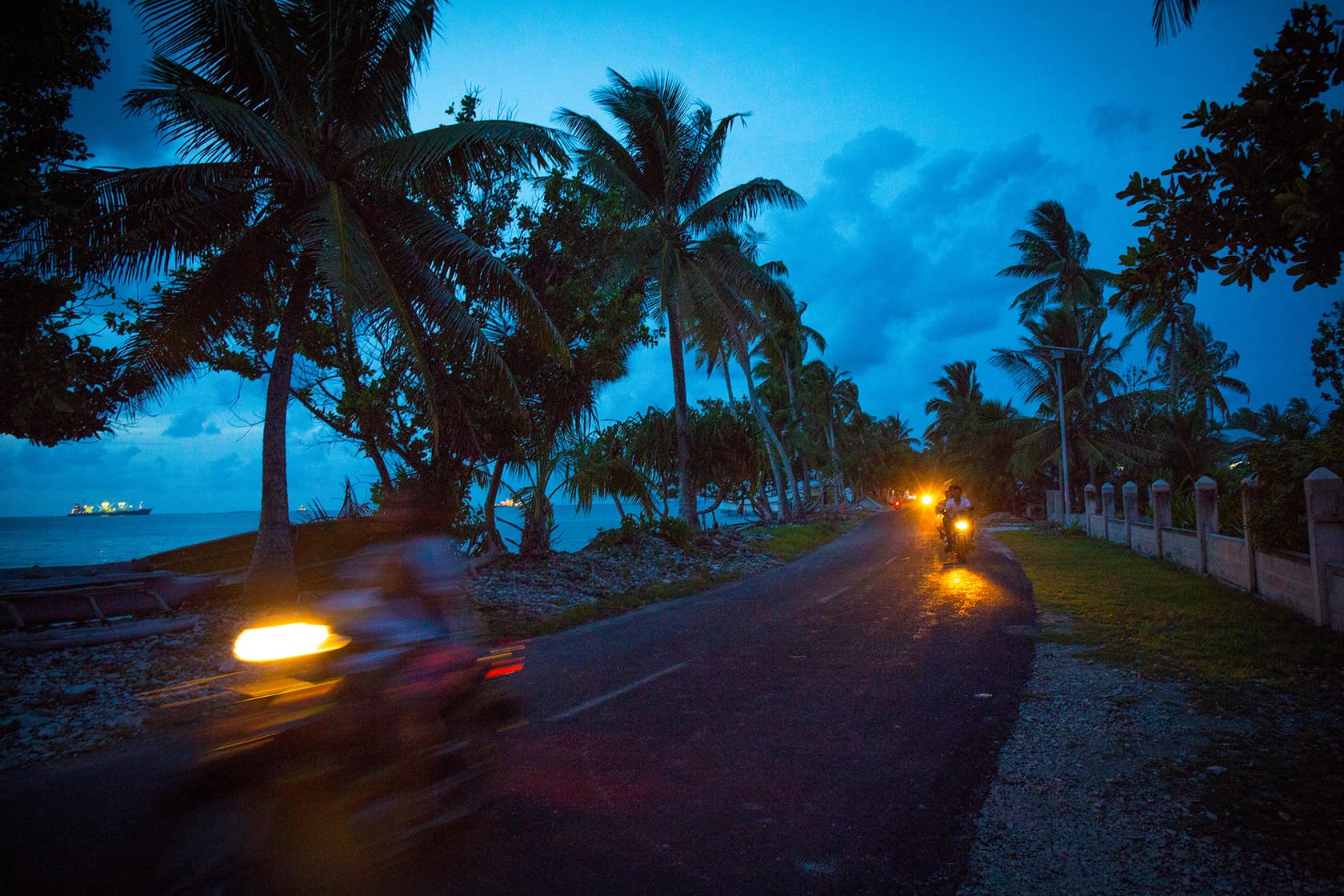
That evening, I join Vera and her granddaughters at their community center dance and potluck. I am presented with a table of home cooked island bounty – whole roasted pig, taro, pumpkin, chicken, fish, bread, rice, and unrecognizable (but very welcome) green vegetable. For three hours after dinner, the men drum, the women dance, and everyone sings. Then the “chief” addresses the community before the young children start performing their dances.
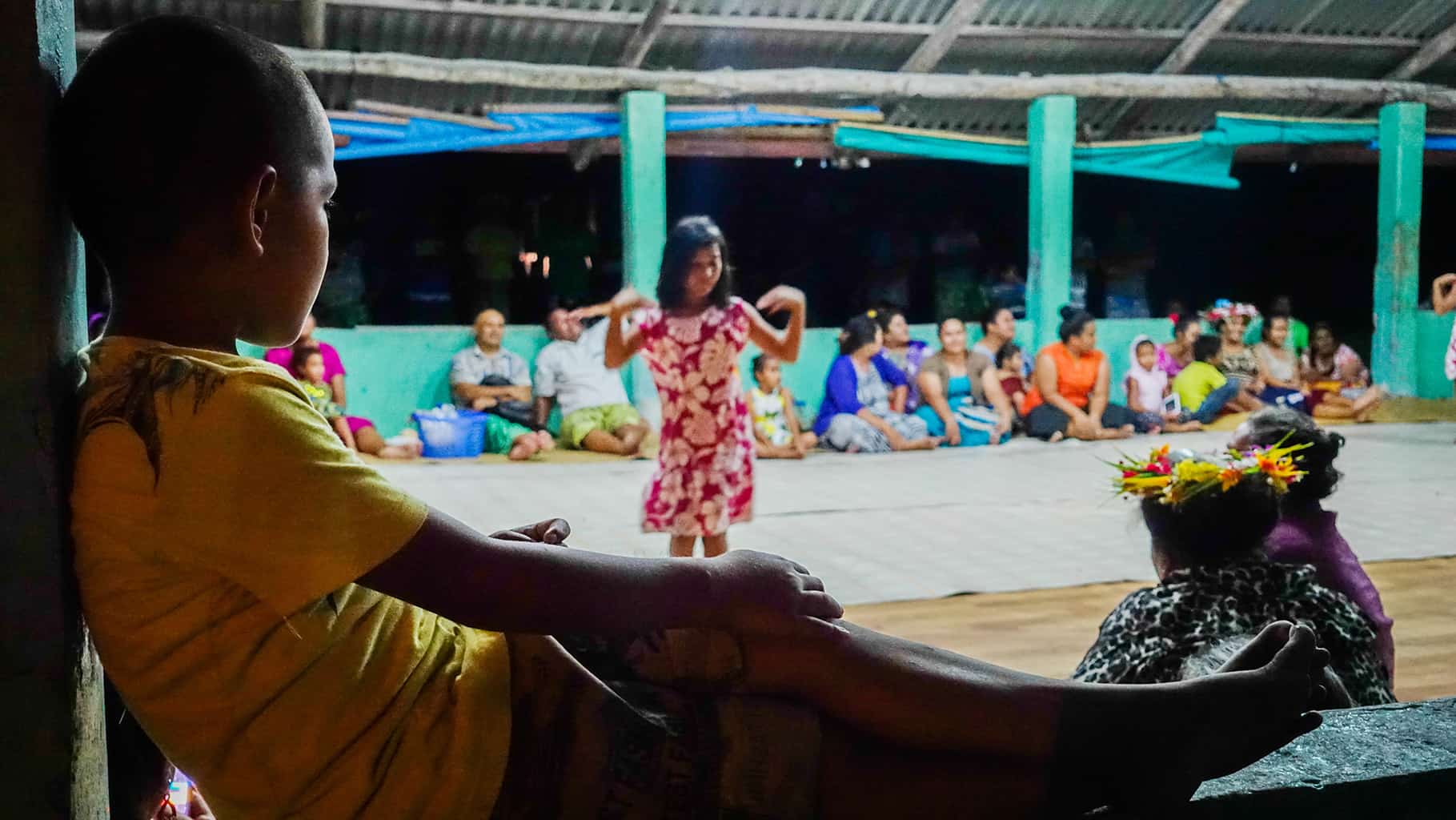
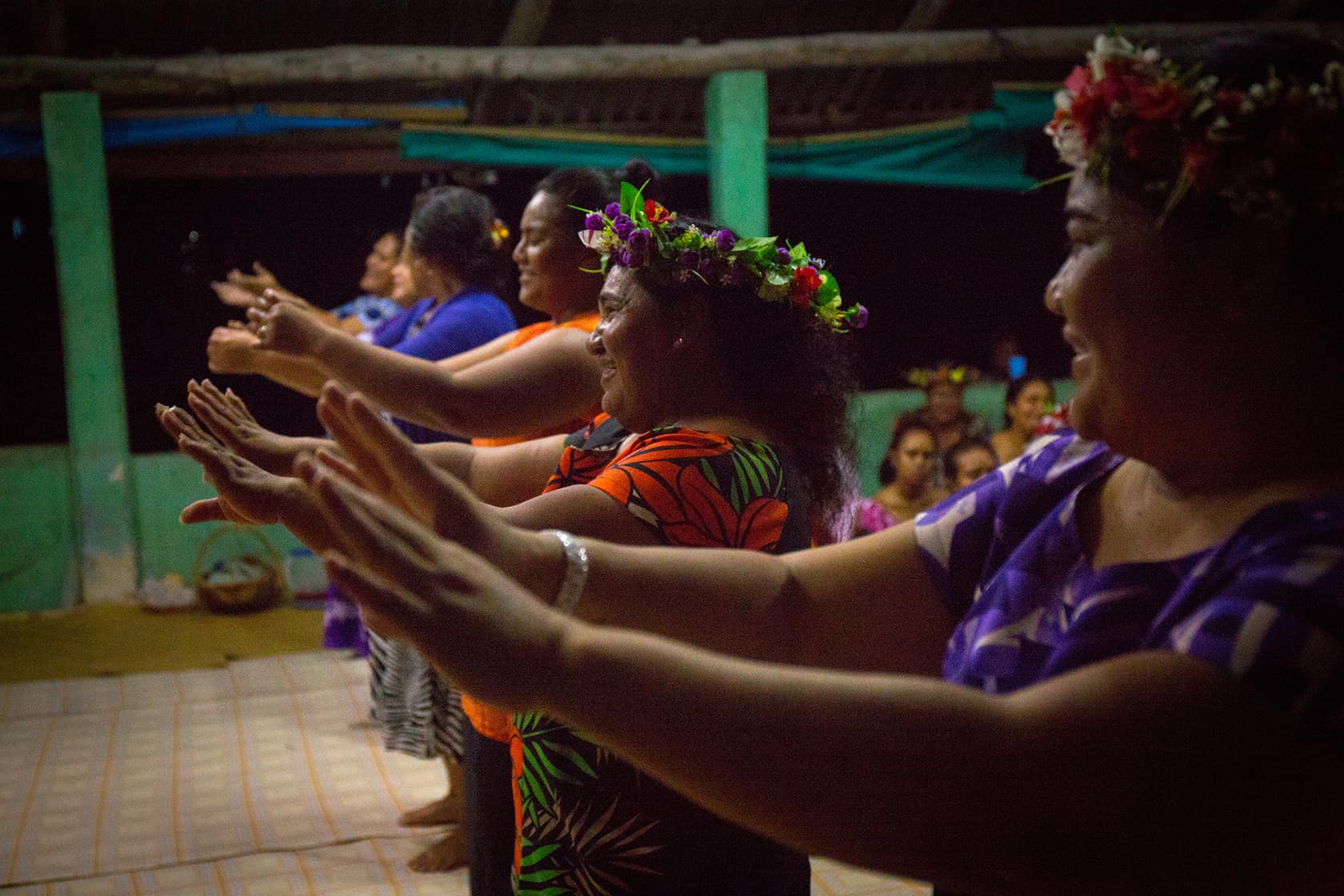
At dawn on Tuesday morning, I pack up my gear. I only have 3 hours to attempt to interview the Prime Minister, go the bank, drive around town and pay all my debts, and make it back to the Tara schooner by noon to disembark.
Gear in tow, I knock on the door, this time at the Prime Minister’s office. Inside are three local ladies chatting about the holidays. When I let them know who I am and why I am there, the secretary, taken aback by my brazen arrival, curtly tells me, “You can’t just walk in and expect to interview the Prime Minister.” I explain that I emailed my request a week ago and that I am only the country for two more hours. She tells me to make a handwritten request. I hand her a letter pleading my case for an interview and she lets me know if he wants to see me, someone will find me.
Defeated, I head off to visit an expat working on climate change issues. Twenty minutes later in the middle of his interview, the secretary arrives to announce, “The Prime Minister will see you now.”
Wow. Ok. This is happening. Right Now.
Who would dare show up with no appointment to interview the Prime Minister of a country without sending prepared interview questions? That would be me. And Prime Minister Enele Sopoaga is probably one of the few heads of state that would be allowed to actually accept without his advisers present.
He greets me cheerfully, but clearly wants to complete the interview as quickly as possible. I am suddenly immensely grateful that no one had answered the door at his private residence. I get right to my questions. In a nation where owning land is what makes you Tuvaluan, what happens when your ancestral property is washed away? What happens when your people can no longer grow food or drink water from their wells? What happens when a nation is uninhabitable? How do you move a nation? What happens when you have to move to another country and have no rights? Who are you in the eyes of the international law if you cannot live in your own country?
Sopoaga wastes no time. He begins with some context, true to Polynesian culture, Tuvaluans are people of the moana – the ocean. With a deep connection to their family, land, sea, tradition, and proud heritage, they truly love and want to stay in their home. But to many Tuvaluans, it seems their fate lies in the hands of the rest of the world. They did not solely create global warming, nor do they have the resources to battle it on their own, but they are about to pay a steep price for the world’s industrialization and conveniences such as driving and air conditioning.
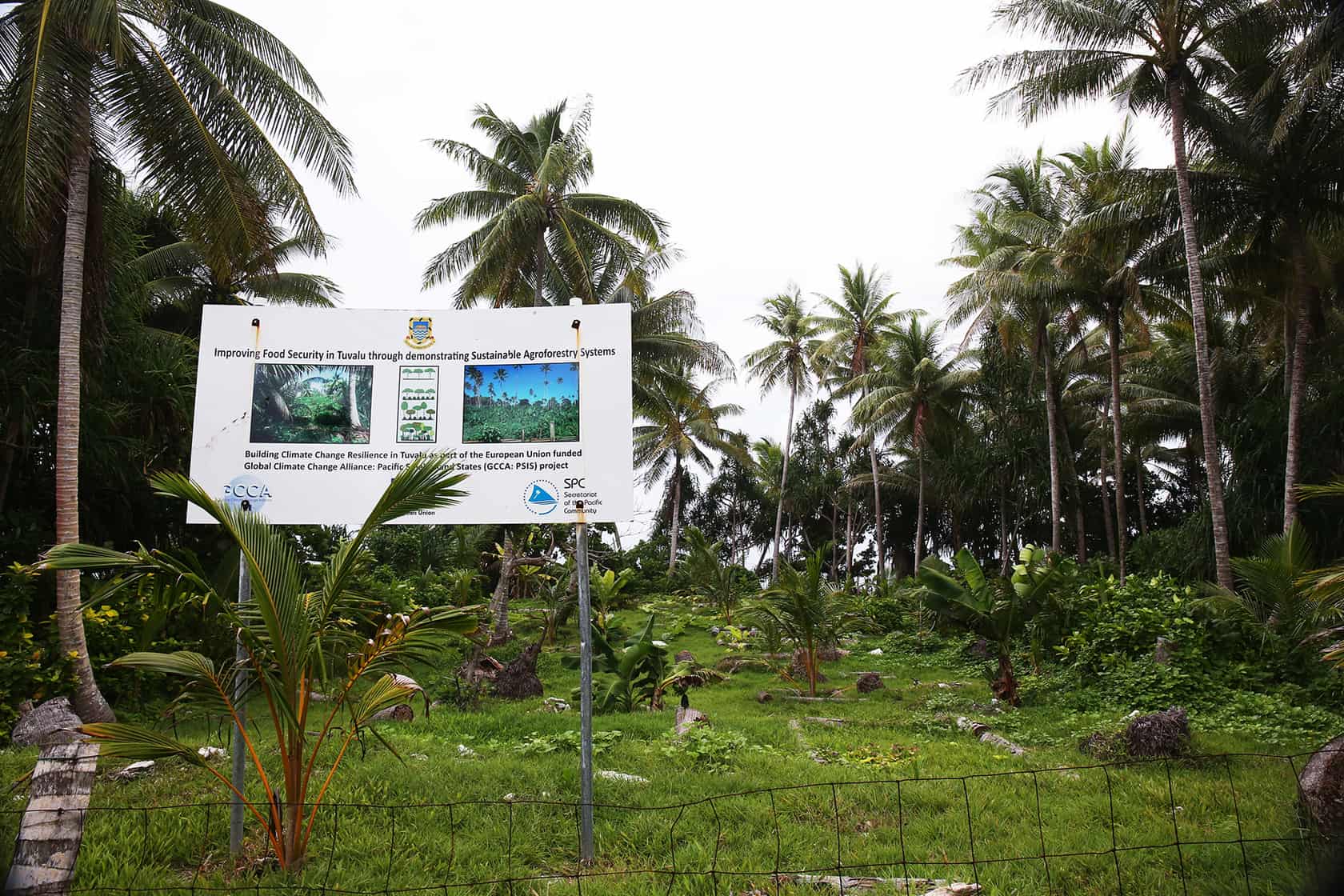
The truth is no one knows how long Tuvalu has and how much of the island nation will disappear. Knowing I am American, he assures me the new president “the honorable President Trump” is an intelligent man and he will surely recognize the importance of this issue. I remain silent as I think of my new commander-in-chief and his environmental policies and ethos. But in the traditional of Polynesian cultures, Tuvaluans still believe in the principal of working in the interest of the greater good and that community comes together to support those in need. Sopoaga assures me the world will recognize the significance of working together on this issue. I silently wish the rest of humanity really did think that way. His belief that this is possible and it will happen is so convincing, I find myself nodding in agreement. Yes this can still happen. The world can still save Tuvalu if it wants to.
We discuss adaptation programs and government programs that support Tuvaluans who wish to go build lives now and work in other countries. Sopoaga’s eyes light up when he tells me he is part of a working group introducing a convention within the UN that will offer people who have to leave their homes due to climate change a legal status other then “refugee” so they can truly live and build a life.
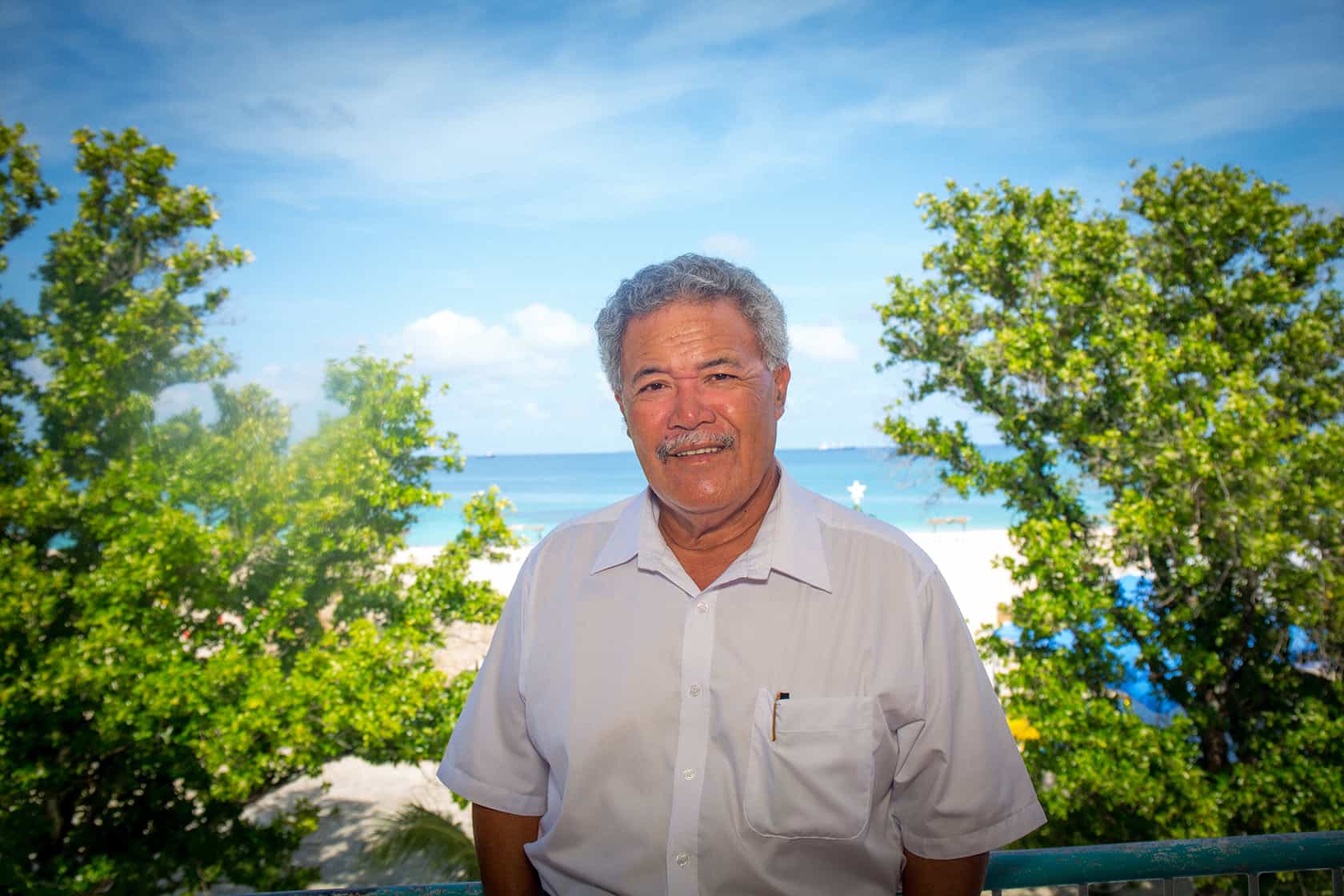
Reflecting on the thousands of displaced from wars across Africa and the Middle East, we agree “refugee” status offers no way to truly rebuild a life and future. His contempt for those who sensationalize the plight of Tuvalu’s people in the context of climate change is clear. “I cannot accept the people of Tuvalu to be regarded as refugees, Environmental Refugees or Climate Change Refugees. I think these are naive references by people who have no idea what they are talking about when they are talking about climate change.”
Tara Expedition Foundation Tuvalu Video Interview with Prime Minister
The truth is no one knows how long Tuvalu has or exactly how much of the nation’s habitable land will disappear. All they know is the sea level is rising in Tuvalu much faster than anticipated, the global community is not on track to mitigate climate change is 1.5 degrees celsius, Tuvalu cannot fix the situation by themselves, and time is running out. Before I leave for the boat, Vera’s granddaughters beg me to go with them to their favorite beach for a swim. As we saunter barefoot down the path smelling the plumeria, a tropical rain sprinkles on us. We reach the pristine white sand and race to be the first to dive into the crystal blue water. As we splash and a handstand contest ensues, we are bathed in a tropical downpour.
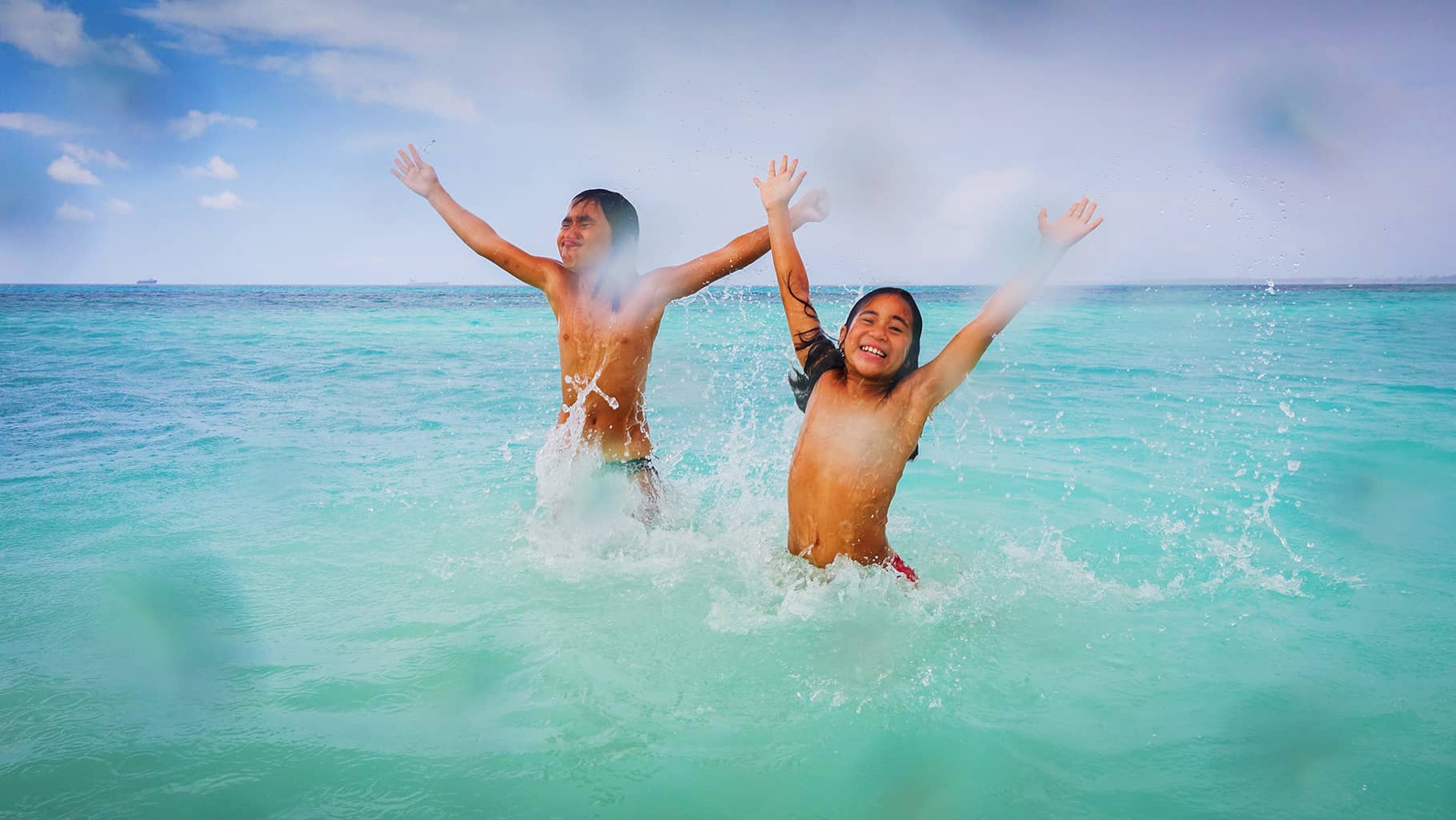
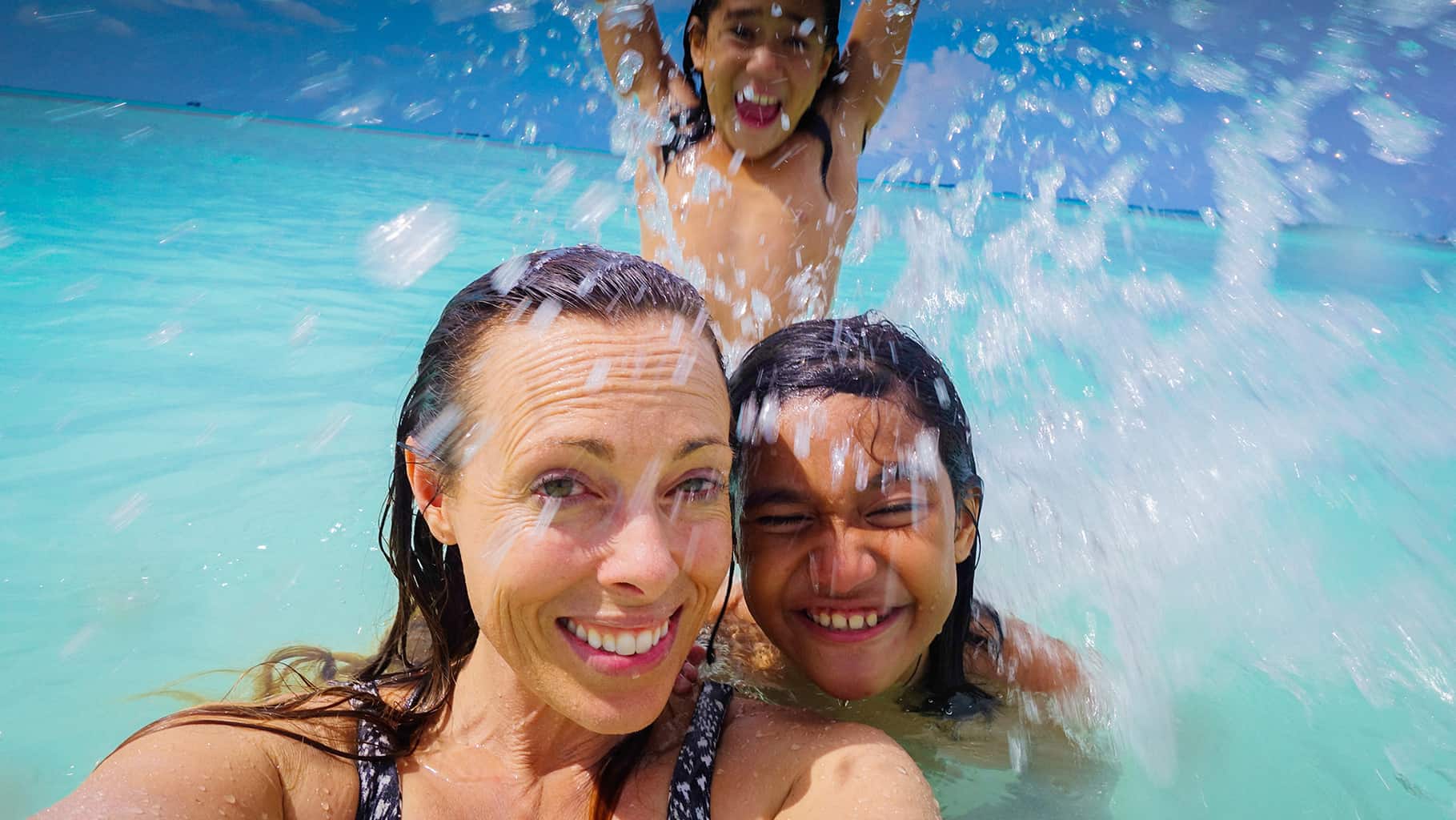
Amid shrieks of laughter, I look around, trying to etch the idyllic scene into my mind. It is hard to believe my two young friend’s children will not be able to play on this beach because it will be gone. This beautiful community will be extinct. Everyone and everything except a few palm trees won’t be here. Ultimately our consumptive lifestyles and choices of convenience are the reason it will all vanish. And there is nothing that Tuvaluans can do about it, alone.
———————————-
More FitWild Stories by Sarah Fretwell
